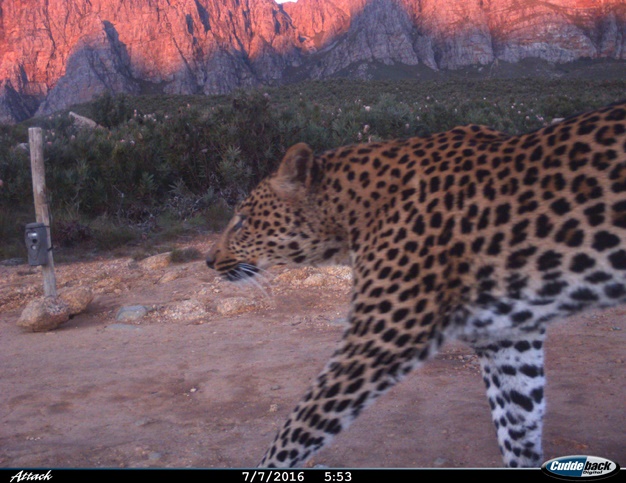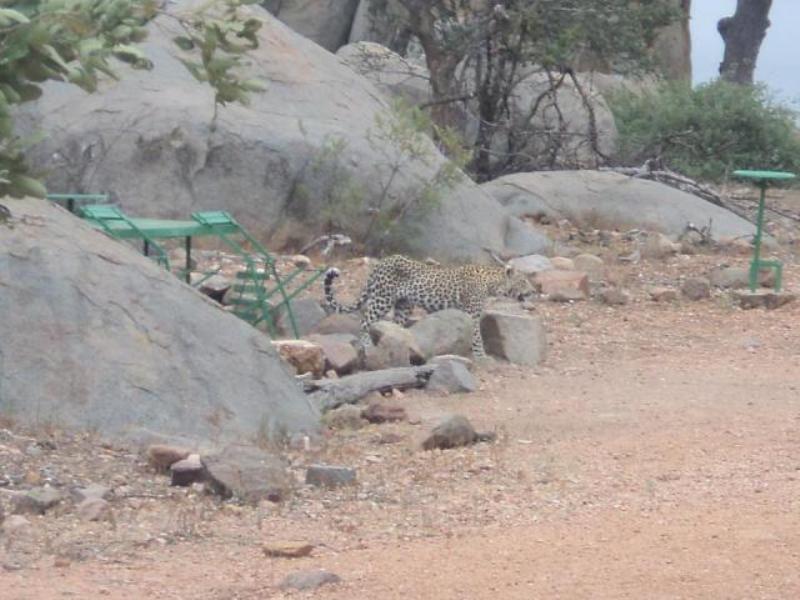2018-04-04 21:00 - Nadia Krige

Cape Town - Despite being among the most widely recognized and admired animals across the globe, big cats are facing many and varied threats. Of course, these are mostly caused by human activities.
On 3 March every year, we celebrate World Wildlife Day, commemorating the signing date of the Convention on the International Trade of Endangered Wild Fauna and Flora (CITES) in 1973.
Established by the United Nations, the day is also normally harnessed to focus on a specific species facing severe threats. The theme for 2018 was (and continues to be) Big Cats: Predators Under Threat.
Overall, their populations are declining at a disturbing rate due to:
- loss of habitat and prey
- conflicts with people
- poaching
- illegal trade
For example, tiger populations plummeted by 95% over the past 100 years and African lion populations dropped by 40% in just 20 years.
One big cat that might not get as much attention as the rest, however, is the notoriously illusive Cape Leopard.
The low-down on Cape Leopards
Arguably South Africa’s shiest big cat, Cape Leopards roam the mountains of the Western and Eastern Cape and rarely grace human eyes with a sighting.
They are about half the size of their savannah cousins, with males weighing only 34kg against their northern counterparts’ 61kg and females in the vicinity of 20kg versus the average weight of 37kg in Kruger.
The Cape Leopard’s home range is also typically a lot larger – males easily cover 170-670 km² (up to 1190km²) and females between 74 and 200km², compared to an average male range of 25-50km² and a female range of 10-25km² in Kruger.
Unlike their Kruger counterparts, these leopards are one of the few big cat species in the world who are lucky enough to roam truly free. With their home ranges stretching beyond boundaries and fences, they aren’t limited to protected areas.
Major threats
Of course, this also makes them more vulnerable to threats, with the following three being most prevalent:
- Habitat loss and fragmentation
As their large home ranges might suggest, freedom of movement is of the utmost importance to the survival of the Cape Leopard.
However, as human populations burgeon throughout the Western Cape and parts of the Eastern Cape, more and more of their space is being swallowed up by settlements.
- Depletion of prey
It’s not only leopard populations being affected by habitat loss, but also their prey.
Along with habitat loss, the snaring of small antelope for bush meat is another growing problem. This is mainly due to widespread poverty and many people being unable to afford meat from supermarkets.
- Human-wildlife conflict
Going hand-in-hand with both of the threats mentioned above, it’s the ongoing conflict between humans and Cape Leopards that has the most devastating effects.
The most common manifestation of this particular threat, is retaliation by farmers – both commercial and subsistence - on leopards who develop a taste for their livestock. Leopards have a tendency to wreak havoc among flocks and herds, killing multiple animals in one go and often not even eating one.
While it’s unclear why they do this, some people believe it may be inspired by a natural instinct to create a pantry of food, which they can return to at a later stage.
Of course, when a whole herd of sheep have been massacred by a leopard, a searing anger from farmers can be understood. However, killing of leopards could hardly be the answer.
Cape Leopard Trust’s work in the Cederberg
Fortunately, a dedicated organisation has these special creatures’ backs.
The Cape Leopard Trust was founded in 2004 and has been working to secure the future of these ‘little’ big cats by taking a holistic approach.
During a recent presentation hosted by Conservation Action Trust, Cape Leopard Trust Operations and Research Manager, Lana Müller, explained just what this entails.
Currently concentrating their efforts on the Cederberg region, Müller and her team believe that they can only make a real impact through paying equal attention to research, education and conservation.
Research
An important aspect of research being conducted by the Cape Leopard Trust is to establish what the current population status is in the Cederberg.
One of the ways in which population status is being established, is through an extensive camera trap survey, consisting of 146 camera traps in 1700km². Preliminary results have delivered 138 979 photos. Of these, 323 were triggered by leopards. Among these, 46 individual leopards have been identified.
A comparison with historic research has also shown that there has been a shift in leopard conflict from the Cederberg to Piketberg area. This is likely due to changes in land use practices and conservation success in the Cederberg.
Conservation
So, what is being done conservation-wise? The focus of the Cape Leopard Trust’s work in the Cederberg, is undoubtedly dealing with human-wildlife conflict.
Actions include site visits to verify if leopard was responsible and advising landowners on mitigation measures. In turn mitigation measures being suggested, include Anatolian dogs and Skaapwagter devices to deter leopards from attacking sheep. This is a far preferable approach to farmers losing livestock and then killing a leopard in retaliation.
Apart from working with commercial farmers, the Cape Leopard Trust also runs community projects to help educate subsistence farmers about better animal husbandry practices.
They have even initiated a project to replace dilapidated kraal fencing with more sturdy structures.
The success of these projects also depends on the Cape Leopard Trust’s willingness to collaborate with local conservation bodies.
“We have a MOU with CapeNature and work well with them. If there is any conflict incident reported to t?hem, they would call us and we would accompany them to the farm and vice verse if people call us directly,” explains Müller.
Education
Finally, the Cape Leopard Trust has made it one of their priorities to help raise a new generation of young people, who might see the importance of their role in protecting the environment.
“We facilitate experiences in nature that change the way young people see themselves and feel about protecting the environment. Our aim is to educate and empower young people through connecting them with nature and instilling an attitude of reverence and respect for the natural environment,” says Müller.
They host educational camps at Rietgat that all have an underlying goal to kindle an understanding of and connection with wilderness in young people. They achieve this through a combination of adventure, art and science.
Why should we care about the Cape Leopard’s survival?
Of course, for those of us who do not live in close proximity to Cape Leopard populations, may ask: Why does this matter?
The answer is simple: our survival depends on healthy ecosystems and every time a species goes extinct, we take one step closer to the edge as well.
Cape Leopards are umbrella species for wider biodiversity conservation, which means their survival (or not) has an even more far-reaching impact.
In short, while the Cape Leopard Trust, CapeNature and a number of other organisations are dedicated to the protection of these vulnerable animals, they need our support.
There are various ways you can help – check out the Cape Leopard Trust website for more information.



